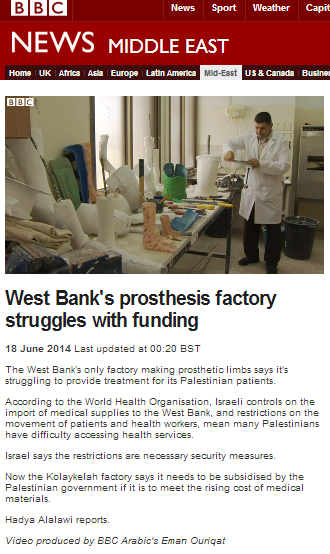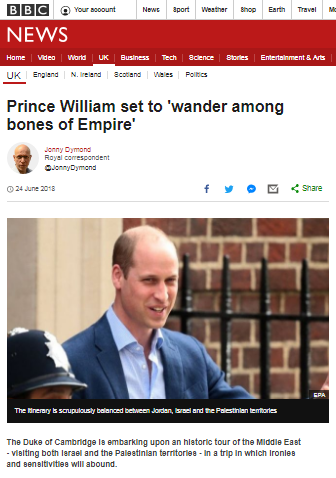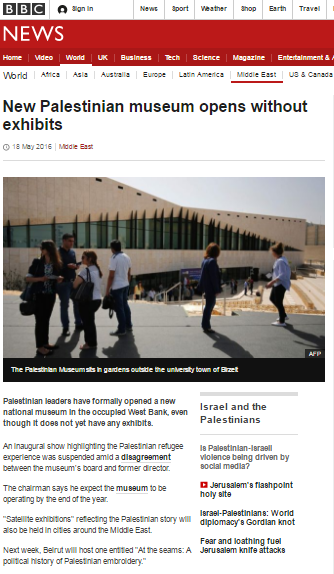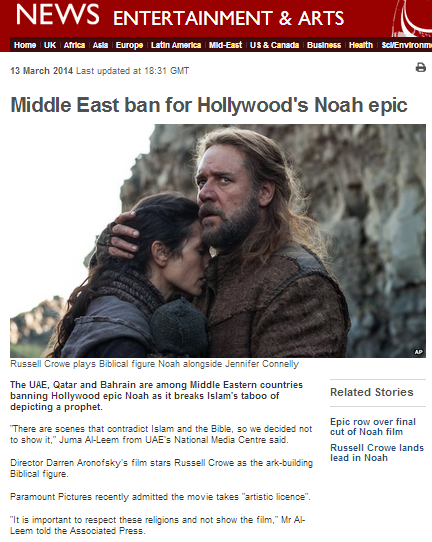June 18th saw the appearance on the BBC News website of a filmed report by Hadya Alalawi titled “West Bank’s prosthesis factory struggles with funding“. The synopsis of the report reads as follows: [emphasis added]
“The West Bank’s only factory making prosthetic limbs says it’s struggling to provide treatment for its Palestinian patients.
According to the World Health Organisation, Israeli controls on the import of medical supplies to the West Bank, and restrictions on the movement of patients and health workers, mean many Palestinians have difficulty accessing health services.
Israel says the restrictions are necessary security measures.
Now the Kolaykelah factory says it needs to be subsidised by the Palestinian government if it is to meet the rising cost of medical materials.
Hadya Alalawi reports.”
So where did that unreferenced statement concerning the WHO come from? Well, coincidentally or not, the Wikipedia page titled ‘Healthcare in the Palestinian Territories’ states, inter alia:
“A 2012 study commissioned by the World Health Organization identifies the Israeli Military’s blockades of the West Bank and Gaza Strip as a major health challenge.”
There is, of course, no “blockade” on PA-controlled areas of Judea & Samaria and restrictions on entry of dual-purpose items into the Gaza Strip do not include medical supplies.
The reference cited to support that claim is a report titled “Barriers to the access to health services in the occupied Palestinian territory: a cohort study” which appeared in late 2012. At least two of the authors of that report are currently involved in political campaigning via NGOs: Jenny Oskarsson of Norwegian People’s Aid and Tony Laurance of Medical Aid for Palestinians.
So is the BBC’s claim that “Israeli controls on the import of medical supplies to the West Bank ….mean many Palestinians have difficulty accessing health services ” (which of course implies that the supplies are inadequate) an accurate one? Well, no. BBC Watch contacted the relevant Israeli authorities and was informed that all medication, based on international standards, is approved.
The Health Department of the Civil Administration (HDCA) also facilitates training for Palestinian medical staff and coordinates the transfer of Palestinians to Israeli hospitals for medical treatment. Access to treatment in Israel does have to be approved due to instances in the past in which such visits were exploited for terrorism – an issue which apparently is of little interest to both the BBC and the WHO.
Here are some recent statistics which demonstrate the inaccuracy of the politicised claims made in the synopsis to this BBC report:
- In 2013, 225,410 medical related permits were issued, 100,145 for patients, 121,967 for family members accompanying patients, and 3,298 for visiting patients receiving treatment in Israel.
- In 2013 the number of emergency medical evacuations rose, with Israel providing 2,207 evacuations by ambulance (up from 600 in 2012) and 11 medical evacuations by helicopter (up from 10 in 2012).
- COGAT also arranged for the overseas treatment of five Palestinians whose medical needs were unable to be met in Israel.
- The number of Palestinian children from the West Bank who received medical treatment in Israel in 2013 stood at 40,000, an increase from the previous year’s 21,270.
- COGAT spent more than a million NIS to provide various treatments for dozens of Palestinian children hailing from families unable to afford the necessary medical bills.
- In 2013, 2,314 Palestinian doctors, nurses, and other medical health care professionals attended the 159 courses, conventions, and programs that Israel hosted.
- COGAT participates in a special program for training physicians, nurses and technicians at Israeli hospitals, for the sake of operating hospitals in Judea and Samaria, and improves the Palestinian health system. Hadassah Ein Kerem Hospital trains 60 Palestinian interns who are replaced every year.
In the filmed report itself, Hadya Alalawi states:
“Many of the recipients [of prosthetic limbs] were wounded in the conflict with Israel.”
The report then cuts to the factory’s director who says:
“The main reason behind building this factory was the occupation because a lot of people were injured as a result.”
Whilst that statement may be intended as PR to contribute to the factory’s fundraising efforts, like this report’s synopsis it does not meet the standards of accuracy and impartiality set out in BBC editorial guidelines. The fact is that it is not “the occupation” which has resulted in injuries, but rather the Palestinian decision to engage in terrorism and violence and that point should of course have been made clear to BBC audiences, along with an accurate, impartial and unpoliticised account of the coordination between Israel and the Palestinian Authority on healthcare.




